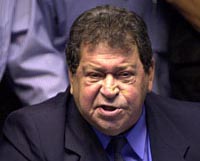 Prime Minister Ariel Sharon's broad-based coalition collapsed Wednesday when Cabinet ministers from the moderate Labor Party resigned in a dispute over funding for Jewish settlements, threatening to push Israel into a bitter election.
Prime Minister Ariel Sharon's broad-based coalition collapsed Wednesday when Cabinet ministers from the moderate Labor Party resigned in a dispute over funding for Jewish settlements, threatening to push Israel into a bitter election.
The crisis ended an uneasy 20-month "unity government" formed as a common front against the Palestinian uprising, and could sabotage US efforts to win support for a peace plan.
Sharon told parliament he would continue to lead the country, suggesting he would try to govern with a narrow coalition of far-right and religious parties rather than call early elections.
The crisis was precipitated by Sharon's rejection of Labor Party leader Binyamin Ben-Eliezer's demands to cut $145 million in funds for Jewish settlements in the $57 billion 2003 state budget. Compromise proposals failed and Ben-Eliezer resigned from his post as defense minister, followed by the rest of Labor's Cabinet ministers.
Under Israeli law, the six resignations only take effect within 48 hours, leaving room for last-ditch maneuvers ?? but politicians from both sides predicted Sharon's broad-based coalition was at an end.
"We must fight terror, but this is the day when we have to present a diplomatic horizon," Ben-Eliezer said, referring to peace talks with the Palestinians. "The prime minister is unable to present a diplomatic horizon."
Critics accused Ben-Eliezer of partisan politics, noting that in polls ahead of Labor's Nov. 19 leadership primary he trails two more dovish challengers, and leaving the government over a settlement dispute could boost his standing.
"It's the height of irresponsibility," said Education Minister Limor Livnat of Sharon's Likud Party.
The budget was put to parliament after the Labor ministers resigned, and it passed with the support of parties outside the coalition ?? as expected ?? by a 67-45 vote; it must pass two more readings in coming weeks before it is final.
Several officials involved in the last-minute talks said Foreign Minister Shimon Peres, who led Labor for much of the past two decades and has been a key supporter of the unity government, tried to persuade Ben-Eliezer to back down. Peres then resigned along with Ben-Eliezer and four other Labor Party ministers.
If the resignations go through, Sharon would face the difficult choice of trying to stay afloat with the support of an array of extreme-right and religious parties ?? meaning political instability and constant pressures for even tougher, internationally unpopular policies concerning the Palestinians.
Sharon aides have said he is more likely to call elections within 90 days, but the prime minister suggested otherwise in his speech to parliament. "We will continue to lead the country in a responsible and clear-headed way," he said.
Although polls show the bloc of parties led by Sharon's Likud would probably win a majority of the 120 seats, there is no guarantee and Sharon himself would probably first have to beat back a challenge for the Likud leadership by former Prime Minister Benjamin Netanyahu.
Either way, the developments bode ill for U.S. efforts to win support for a three-phase peace plan envisioning a provisional Palestinian state by 2003. Elections would mean a delay of many months, and Sharon's far-right partners in a narrow coalition would likely object to many of the provisions, such as a settlement freeze and a significant Israeli troop pullback.
Palestinian reaction was mixed, with Cabinet minister Saeb Erekat calling the crisis "an internal Israeli matter." But Erekat also warned that "if there is a new coalition between the Likud and the right wing in Israel, it will also be at the expense of the Palestinian people and against the peace process."
Recent developments on the Palestinian side also suggested the peace plan would run into problems. The proposal calls for sweeping reforms of the Palestinian government and the security services. However, the Palestinians signaled Tuesday they would settle for more modest changes when parliament approved a new Cabinet that was largely unchanged, with only three new ministers.
Labor joined forces with the hard-line Sharon after he routed their candidate in prime ministerial elections in February 2001, several months after peace talks failed and fighting with the Palestinians erupted.
But from the beginning, the party was widely expected to bolt the coalition before the next election ?? which by law must be held by November 2003 ?? to try to position itself as a moderate alternative to Sharon.
Sharon and Ben-Eliezer have worked closely in leading the struggle against Palestinian militant groups waging a campaign of terrorism in Israel ?? a campaign which escalated to the point that Israeli troops reoccupied most of the Palestinian cities previous governments handed over to Palestinian self-rule.
But Labor's constituency has grown increasingly unhappy with Sharon's repeated rejection of international efforts to find a way out of the fighting and his determination to crush the Palestinian uprising before any peace talks resume.
Tensions flared in recent weeks over Ben-Eliezer's decision to dismantle dozens of Jewish settlement outposts established throughout the West Bank in recent years ?? in some cases, housing settlers outnumbered by the soldiers required to protect them.
During a three-hour session Wednesday to try to settle the funding issue, shouts were heard and at one point Ben-Eliezer stormed out, only to return later, aides said. By evening, negotiators announced the talks had collapsed.
Israel's coalition governments are chronically unstable and plagued by internal fighting. No government has completed its full term since the 1980s, and the country has had five prime ministers in the past seven years.
(China Daily October 31, 2002)
|

